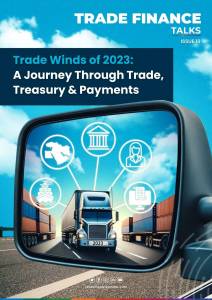Estimated reading time: 5 minutes
As the echoes of this year’s Sibos conference begin to fade, the transformative ideas and groundbreaking discussions that took place continue to reverberate throughout the industry.
Trade Finance Global (TFG) was at the heart of these conversations, offering a unique and insightful perspective on the future of trade finance. After some time to reflect, here are our top takeaways from the jam-packed conference.
1. The API revolution: A promising future, with work to be done
When TFG attended the “Corporate to Bank APIs for Guarantees – Are we Future Ready?” panel with Samuel Mathew from Standard Chartered Bank, Baptiste Audren from Komgo, Juliette Kennel from Swift, Joon Kim from BNY Mellon, and Samuel Mathew, it became clear that APIs are the best way forward for the industry.
But the question is, how and when do we implement the new language, and what are the next steps for industry standardisation?
Standardisation is no longer a mere buzzword; it’s an imperative for an industry that has long grappled with fragmentation and inefficiency. This is a revolution that’s here to stay, but it’s not a finished product yet.
2. The industry has a lot that keeps them awake at night
TFG’s roundtable discussion with the BAFT Global Trade Industry Council was a reminder that technology alone won’t solve the industry’s challenges.
From geopolitical tensions to the looming threat of fraud, these are the existential questions that are keeping industry leaders awake at night.
These aren’t just challenges; they’re variables that will define the future trajectory of trade finance. It’s a wake-up call for the industry, urging us to look beyond technology and consider the human elements that drive trade.
But we all need a wake-up call sometimes, and it is not a negative thing. Sibos 2023 was a sign that the industry is already starting to come together to address these overarching challenges.
3. A borderless payments industry: More than a dream
Visa’s vision for next-gen cross-border payments, as covered by TFG, is a reality that is closer than many might think. It’s a glimpse into a future where financial borders are less of a barrier and more like formalities.
The idea of sending money across continents as easily as sending a text message is not just a pipe dream; it’s a tangible future made possible by rapid technological advancements.
This is a future that’s within our grasp, and it’s reshaping the way we think about global trade.
4. AI and collaboration: The new frontier
Red Hat’s approach to combining AI with federated learning introduces a new way of thinking about technology in trade finance. Rather than viewing AI as just another tool for automation, the focus is on its potential for collaboration with human operators.
In this setup, AI systems can learn and adapt based on human interactions, creating a more dynamic and responsive environment. This goes beyond simply automating routine tasks; it opens the door for a more nuanced interaction between human expertise and machine capabilities.
The result is a more flexible and adaptive approach to problem-solving in trade finance, offering new avenues for innovation and efficiency.
5. The beyond the cloud
The cloud is evolving from a mere storage solution into a platform for innovation and collaboration in trade finance. The discussion with Finastra and IBM experts highlighted how the cloud is becoming a foundational element in this sector.
It’s not just about moving existing systems to the cloud; it’s about using its capabilities to enable real-time data sharing, enhance security, and facilitate agile development.
This shift turns partnerships from tactical alliances into strategic imperatives. Financial institutions are finding that cloud-based collaboration allows for quicker responsiveness to market changes and faster innovation.
Additionally, the cloud’s data analytics capabilities are making it easier for institutions to align with the growing demands for sustainability in trade finance.
In essence, the cloud is reshaping the way work gets done in trade finance, offering new avenues for collaboration, innovation, and sustainability.
6. Digital-first: The new normal
The collaboration between Lloyds Bank and Enigio, highlighted during Sibos, marks a significant step toward a digital-first approach in trade finance. With the Electronic Trade Documents Act now in effect, digital trade is becoming a standard practice rather than an optional feature.
This collaboration is not just about adopting new technologies; it’s about integrating digital processes into the core of trade operations.
This move toward digitalisation is making transactions more efficient, reducing the need for physical documentation and streamlining workflows. It’s also enhancing security by leveraging digital signatures and encryption, thereby reducing the risk of fraud.
The shift to a digital-first approach is not just a trend but a practical response to the evolving demands of the trade finance industry, offering benefits in efficiency, security, and compliance.
As we look back at our experience at Sibos, it’s evident that the future of trade finance is not just unfolding organically; it’s being actively shaped by these critical discussions and innovations.
These top Sibos takeaways serve as a roadmap for navigating the complexities of a rapidly evolving industry.














































